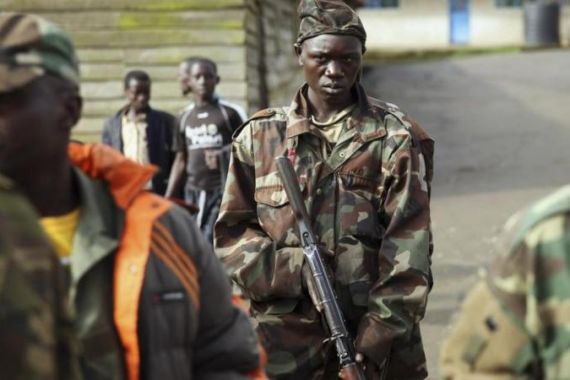Goma residents sceptical after M23 pullout
Many residents of the eastern DRC city captured by rebels are wary they won’t be gone for long.

Goma, Democratic Republic of Congo – They rode on the back of four-wheel-drive vehicles and flatbed trucks and strode out on foot – singing, cheering and clapping as if celebrating a victory, even though it was a military withdrawal.
A crowd of a few hundred gathered and watched the M23 rebels’ animated performance as they departed from Goma, the eastern Congolese city that the fighters captured on November 19.
Government soldiers withdrew from the city as M23 advanced, and UN forces did not intervene, saying they lacked the mandate to do so.
But Saturday’s pullout, brokered by regional powers, was merely a precondition for direct negotiations between M23 commanders and DRC President Joseph Kabila over the group’s grievances. Many here wonder how long it will last.
According to the agreement , M23 would move 20km outside Goma, leaving 100 troops at the city’s airport, alongside government and Tanzanian troops.
The rebel group will then begin negotiations over a series of concerns that catalysed the formation of the group back in April. The M23 movement says Kabila’s government failed to fulfill many of its promises agreed in a peace deal signed March 23, 2009.
The people of eastern Congo are sceptical of the negotiations, after having paid a high price during the rebel advance. The International Committee of the Red Cross says at least 90 people were killed and hundreds wounded in the fighting.
Hundreds of thousands have been displaced, the Red Cross says.
Ongoing crisis
Few in Goma need to be reminded that this crisis is far from over. Many residents said they did not believe all of the M23 fighters had left the city.
Jean Sombe watched as about 250 fighters assembled at the Cercle Sportif in preparation to leave.
“The soldiers we see here are the ones that took over this city? Is that it?” the 78-year-old said. “I think they are still here in hiding.”
Many residents are convinced that M23 soldiers swapped their military fatigues for civilian clothing and will remain in the city as “infiltrators”.
“Look, I am a Congolese. I am from this place. I can tell the difference between a civilian and a soldier. And, for sure, they are here,” 33-year-old mechanic Thierry Bisimwa told Al Jazeera. “Taking off their uniform and putting on civilian dress is a strategy.”
M23 has done little to allay the fears of Goma residents. Speaking at the handover ceremony, the group’s military commander, General Sultani Makenga, urged the government to honour its commitments.
“We are not very far and we can come back,” Makenga warned.
A lack of trust
Samuel Mandiko, a 57-year-old public sector worker, said the town “is in a state of confusion … both parties are playing games with the people”.
“We have a situation where army officials, in the middle of a war, were selling weapons to the M23 … what is going on?”
He was referring to General Gabriel Amisi, the DRC’s chief of land forces, who was suspended on November 23 when the UN alleged he had been “smuggling arms” to multiple rebel groups in the region.
According to people here, he was not the only military official playing both sides.
“We have an army with high-level officers selling arms and information to the other side. This is why they are so incompetent,” Bisimwa said.
A lack of strong political leadership is also a problem in the city, another resident said.
“Even when the government was here before the M23, they used to abuse us, disturb us,” said Esperance Simire, a food vendor in her late 40s.
“Yes, I am happy that M23 is leaving, but I don’t think the government will return to bring anything special to our lives,” she said.
The eastern DRC has not seen peace for almost two decades, with two major wars fought, in which it is estimated up to five millions lives were lost, as well as a series of low-level insurgencies still operating in the hills and forests outside of Goma.
There is a smouldering disdain for the United Nations here, as well as rage directed towards neighbouring Rwanda and Uganda for their roles in the crisis.
|
“These armed groups … were pushed into the DRC and never removed … We have never interfered with other countries and now, enough is enough. ” – Claude Kitumaini, Goma resident |
“The UN has failed, the DRC government has failed, and there will have to come a time when we will have to take up arms and fight Rwanda,” said Claude Kitumaini, a 44-year-old technician in Goma.
Though Rwanda has repeatedly denied supporting M23, residents here believe otherwise.
“Even the way the (M23) soldiers behave, we can tell they are not part of us,” Bisimwa said.
The UK suspended aid to Rwanda last week over the situation in eastern DRC, but the refusal of the international community as a whole to hold DRC’s neighbours to account is drawing the ire of the people here.
“These armed groups … were pushed into the DRC and never removed … We have never interfered with other countries and now, enough is enough,” Kitumaini said.